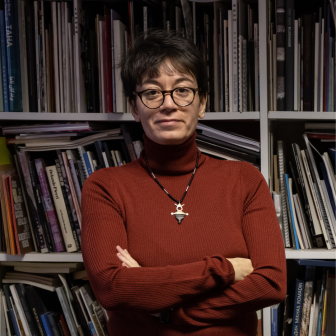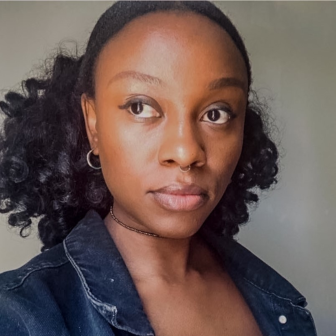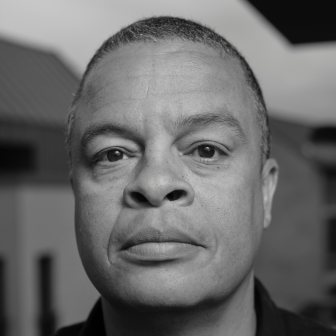
Generational Abundance
Guests: Alfred Schaffer, Samira Negrouche and Kéchi Nne Nomu
A conversation between poets whose work and performance refer to their heritage. The fact that their work embodies stories that put us into generational categories (for example first, second, and even third generation migrants) speaks to its inherent importance. But we are more than just vessels for the past. What is it that we add to this tradition? Alluding to how Babs Gons views writing poetry as participating in a centuries-old tradition, during this program we ponder the question: what is it that we add to it? And what is the role of our background in this?
Alfred Schaffer
One of the most talented poets of his generation writing in Dutch, Alfred Schaffer debuted in 2000 with the collection Zijn opkomst in de voorstad (His Rise in the Suburbs). His second book, Dwaalgasten (Vagrants; 2002) was nominated for the VSB prize. After that came Geen hand voor ogen (No Hands Before Your Eyes), Schuim (Foam; 2006) and K...
Guests: Alfred Schaffer, Samira Negrouche and Kéchi Nne Nomu
A conversation between poets whose work and performance refer to their heritage. The fact that their work embodies stories that put us into generational categories (for example first, second, and even third generation migrants) speaks to its inherent importance. But we are more than just vessels for the past. What is it that we add to this tradition? Alluding to how Babs Gons views writing poetry as participating in a centuries-old tradition, during this program we ponder the question: what is it that we add to it? And what is the role of our background in this?
Alfred Schaffer
One of the most talented poets of his generation writing in Dutch, Alfred Schaffer debuted in 2000 with the collection Zijn opkomst in de voorstad (His Rise in the Suburbs). His second book, Dwaalgasten (Vagrants; 2002) was nominated for the VSB prize. After that came Geen hand voor ogen (No Hands Before Your Eyes), Schuim (Foam; 2006) and Kooi (Cage; 2008), Mens dier ding (2014) en Postuum. Een lofzang (2016). After winning the Jo Peters poetry prize for his first collection, he was nominated for the C.Buddingh prize and went on to win the Hugues C. Pernath prize, the Ida Gerhardt poetry prize and the Jan Campert prize.
Alfred Schaffer has been awarded the Herman de Coninckprijs for his collection Wie was ik, strafregels and the prestigious P.C. Hooft Prize 2021 for his poetry oeuvre.
Kéchi Nne Nomu
Kéchi Nne Nomu is a Nigerian writer, poet, editor and academic lecturer based in New York. Her poetry displays an intimate perspective on big topics such as migration and displacement, violence and death. She draws connections between physicality, the body and sexuality and the effects that history has on contemporary Nigerian society. This immediate intimacy and the physicality leave her audiences with a strong and deep impression.
Nomu holds an MFA in poetry from New York University, where she received support as a Stein/Brodey Fellow. She has taught courses in writing and poetry at Long Island University and the University of Virginia. Additionally, she works as an editor and writer. Her poetry has been published in The Yale Review, Narrative Magazine, Boston Review, The Adroit Journal, The Wall Street Journal and elsewhere. She has been a finalist at both Narrative Magazine’s Fourteenth Annual Poetry Contest and The Adroit Journal’s 2023 Gregory Djanikian Scholars in Poetry and semifinalist for the Aura Estrada Short Story Prize.
Samira Negrouche
Samira Negrouche was born in 1980 in Algiers where she still lives. She is a poet, editor and translator – from Arabic to French – who trained as a doctor, but who has chosen her writing and literary projects over the practice of medicine for several years. She has frequently collaborated with visual artists and musicians. Her books include: A l’ombre de Grenade (2003), Le Jazz des oliviers (2010) and Six arbres de fortune autour de ma baignoire (2017) and Quai 2/1 : Partition à trois axes (2019) that grew from a performance with a violinist and a theorbist. There is great variety in Samira’s work, from the lyrical to the narrative, wry analyses of human interaction juxtaposed with the painterly, and ekphrastic, with the temptation of abstraction.
'Six Arbres de fortune autour de ma baignoire' (Six makeshift trees around my bathtub) is the title poem of a book consisting of seven sequences, often poems that reflect or obliquely reference sculptural and pictorial installations, or musical compositions, as well as the landscape that continually renews her imagination. The sequence here depends on images, juxtaposes and eludes them: cartoons, Orthodox icons, rock paintings in the Hoggar mountains of Algeria, astronomy, a contemporary cityscape – and exemplifies the verbal legerdemain with which she observes and presents her world to us.
Su June 9
LantarenVenster - foyer
Language and duration
Language: English
Duration: 30 minutes
Important information
This programme is free to attend as part of our foyer programme.
A sign language interpreter will be present during this programme.
Festival poets
Sponsors














